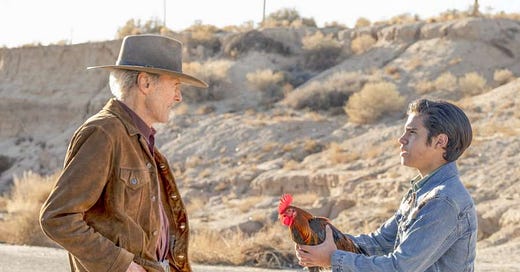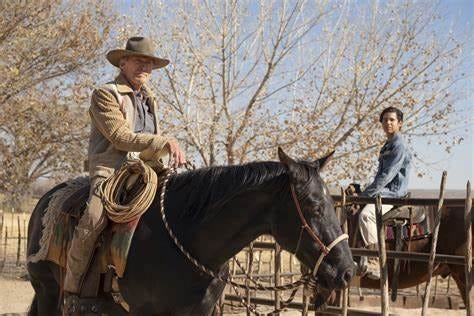The indefatigable and at 91 years old the seemingly immortal Clint Eastwood produces, stars in and directs Cry Macho. It is not a bad movie, but sadly it is not Eastwood at his best. If this is his last film it will be a whimper rather than a bang that ends his career.
Eastwood plays Mike Milo, a former rodeo star and horse trainer. After a severe injury, alcoholism, drug dependency and the death of his wife and son, Milo is a shell of his former self. Most of this information is communicated in the first five minutes through expositional dialogue between Milo and his former boss, Howard Polk (Dwight Yoakam). This infodump makes a bad first impression. Yoakam’s acting exacerbates the problem; he actually manages to sound like he is addressing the audience! Luckily, Yoakam’s character is not in the film very often and subsequent appearances are better.
Polk claims his 13-year-old son, Rafael (Eduardo Minett), is abused by his ex-wife, Leta (Fernanda Urrejola). He asks Milo to bring the boy back from Mexico. Milo is hesitant, but Polk had helped him through his struggles with substance abuse and grief. Milo figures this favor will make them even.
Leta lives in a Mexico City mansion with her own private security, or more accurately henchmen. She is hosting a party and appears drunk when Milo meets her. She informs Milo that Polk has sent two other men before him to retrieve Rafael - the first indication that Polk has ulterior motives. She also explains that “Rafo” is living on the streets and participating in cockfights.
Rafael’s rooster is named Macho, or “Strong.” He later explains how Macho was weak, but with training he became a competent fighter. “He killed a very big rooster,” Rafo says, “From that time he’s Macho. A champion.” He later compares the rooster to himself: “He’s macho, like me.” This is the theme of the film: Rafael is on the cusp of manhood, yet he doesn’t know what it means to be a man - or, rather, his conception of manhood his puerile.
Milo challenges Rafo’s childish preconceptions. He teases, “Guy wants to name his cock Macho, it’s okay by me.” And elsewhere says, “And you can watch all that macho crap up there [in Texas], too. Nobody likes that stuff.”
Back at Leta’s mansion, Milo spurns her sexual advances. That she made them in the first place is baffling. What could this youngish, beautiful and rich Latina see in an old, washed-up gringo? In any event, it seems this incites her decision not to let Milo take Rafael. She orders her henchman Aurelio (Horacio Garcia Rojas) to tail him.
Milo is content to return to Texas empty handed, but Rafael stows away in his truck. Rafo has, in fact, been beaten by his mother’s string of boyfriends. He poignantly states, “On the streets, I trust no one. But it’s safer than at home. You can never trust no one.”
He is also enamored with the idea of becoming a cowboy on Polk’s ranch. So Milo reluctantly agrees to take the boy north against Leta’s wishes. Now they must get across the border while being pursued by Aurelio and the federales, who believe the boy was kidnaped.
That pursuit is breathtakingly undramatic. Aurelio appears only twice, both times easily thwarted. The feds are seen occasionally, but never come near our heroes. A sheriff's deputy menacingly drives by in several scenes, but when he finally does approach Milo it is only to have him attend to his wife’s wounded dog.
Cry Macho never builds up any significant external conflict. Theoretically, Milo’s antagonists are his pursuers, but since they rarely make an appearance on screen and almost never confront him, the film’s tension falls flat. Compare that to Gran Torino wherein the gang that menace Eastwood’s character is a constant and brooding threat which culminates in the rape of the neighbor girl. No such cataclysm happens in Cry Macho. The closest we get is a brief car chase.
But the film does have great character development. As Milo and Rafael travel through Mexico, they share stories and discuss what it means to be macho. In one particularly touching scene, Milo talks about his wife and son dying in an automobile accident.
While stranded in a small town, Milo becomes a horse trainer once more. He teaches Rafael to ride. He acts as the town’s veterinarian although he has no credentials other than “being good with animals.” He also develops a relationship with a restaurateur named Marta (Natalia Traven) who doesn’t speak English. The language barrier doesn’t stop them from falling in love.
These scenes are just a few examples. The entire movie is really about these characters growing with one another and because of one another. They become better than they were in spite of hardships. The boy becomes a self-assured young man; the washed-up rodeo star finds new purpose.
Throughout the trip Milo talks to Polk by phone. These calls become increasingly tense as Milo comes to realize his former boss has played him. Polk doesn’t care about his son or the abuse he received. Rather, Polk wants Rafael for leverage in ongoing court battles with Leta. This is the true, internal conflict of the film. Rafael is stuck between the proverbial rock and hard place - his mother and his father. Neither of them is much of a parent.
Milo says, “We all have to make choices in life, kid. You have to make yours.”
As the film approaches its conclusion, Rafael has no one left to lean on - not his father, not his mother. Not even Milo because Milo also violated Rafeal’s fragile trust by not divulging Polk’s true intentions sooner. Rafo, therefore, must stand on his own, make his own way. He gives up the rooster and with it, perhaps, his former puerile notions of manhood.
In conclusion, Cry Macho is largely a disappointment. The action is weak. The acting could have been better. That Eastwood’s 91 year old character attracts women half his age and can tame wild horses is a stretch. On the other hand, Rafael’s development into a young man is a delight to watch. It is also a theme not often explored by cinema these days…at least not explored well.





Really enjoying these film reviews, thanks muchly! I don't have much time for watching movies, but this one seems intriguing.
This is kind of meta, but . . . what are your thoughts on why the Western genre has captivated American artists, writers, and audiences the way it has? Is it just a holdover from when there was an untamed west left to explore and settle? Or is the West in ideal venue for exhibiting qualities that our national psyche finds virtuous, i.e. toughness, fortitude, courage, etc., that aren't typically thought of as "city" virtues? I notice that romcoms, which are usually set in cities, don't often portray a character having to exhibit courageousness. On the other hand, superhero movies often do, and they are frequently set in cities. What do you think?